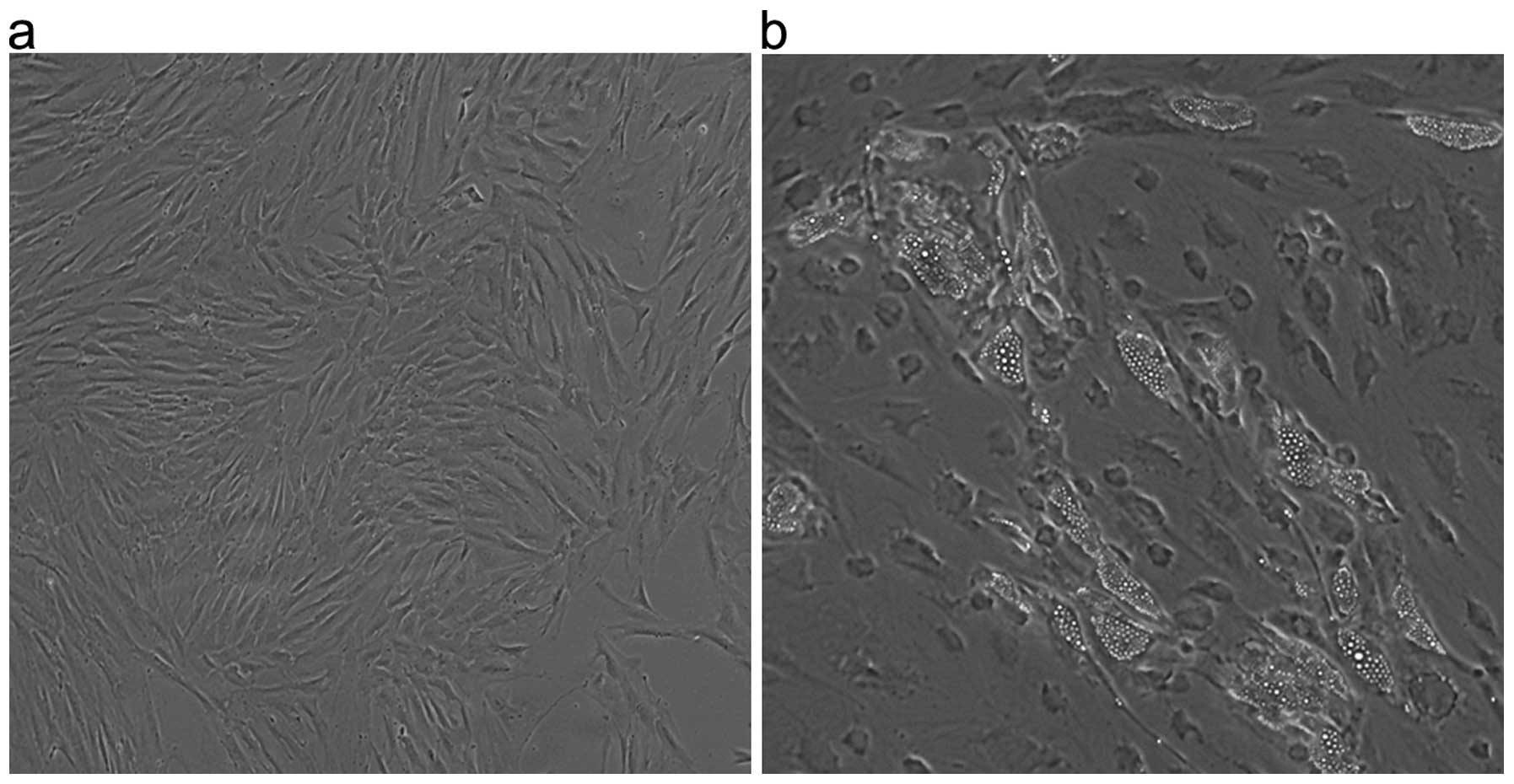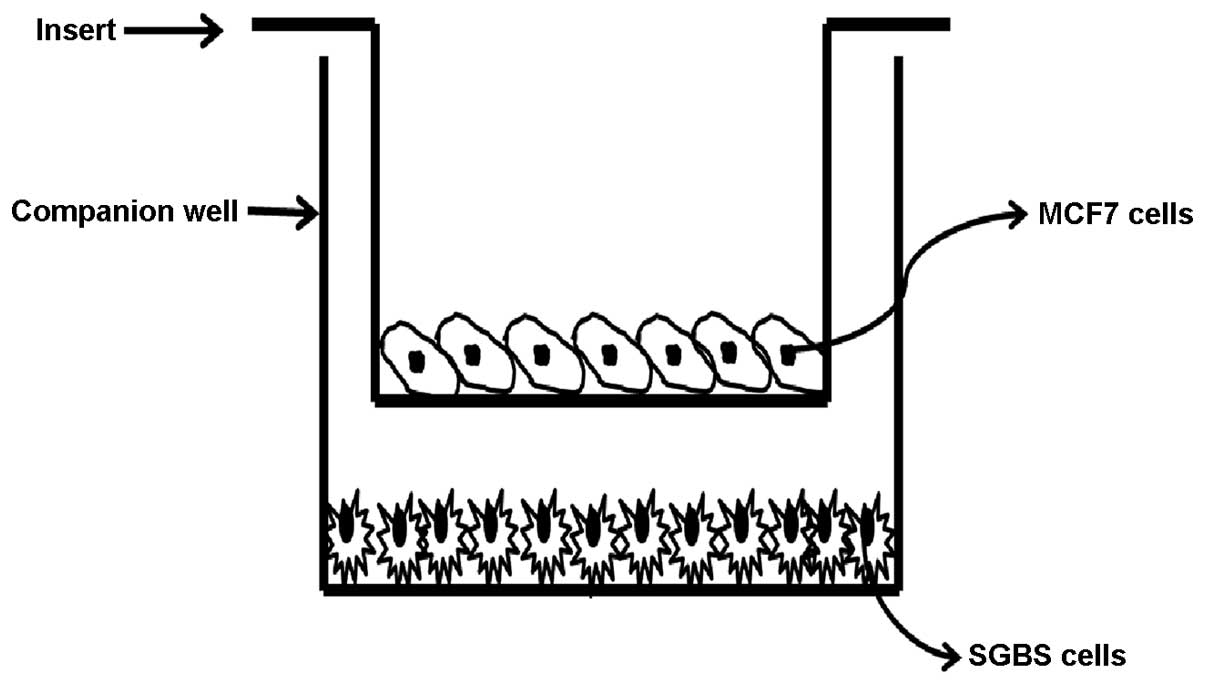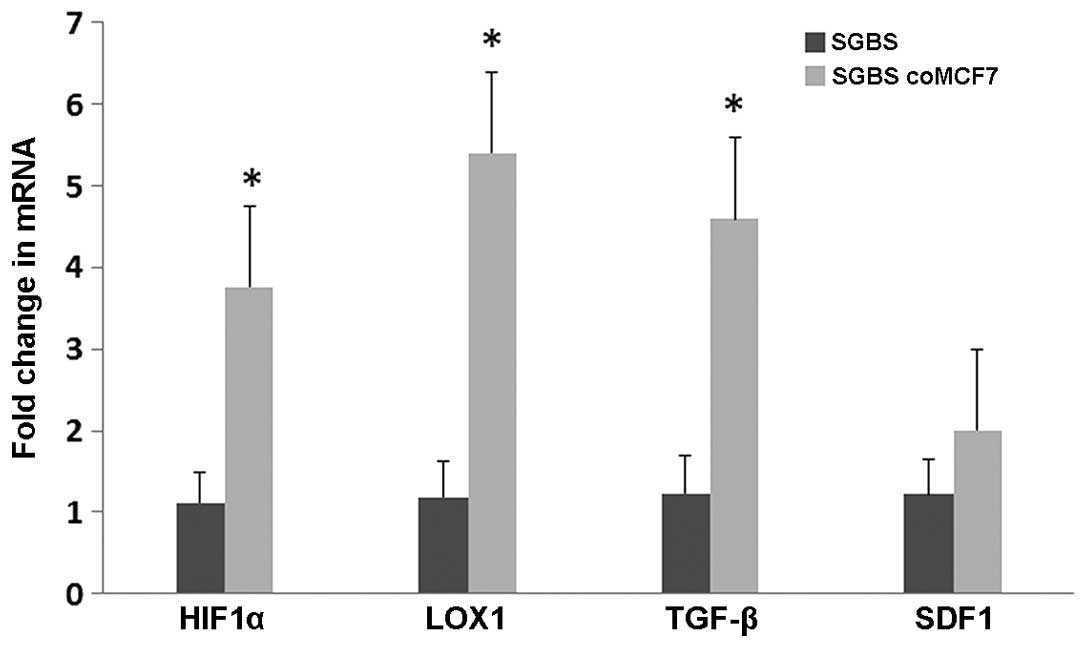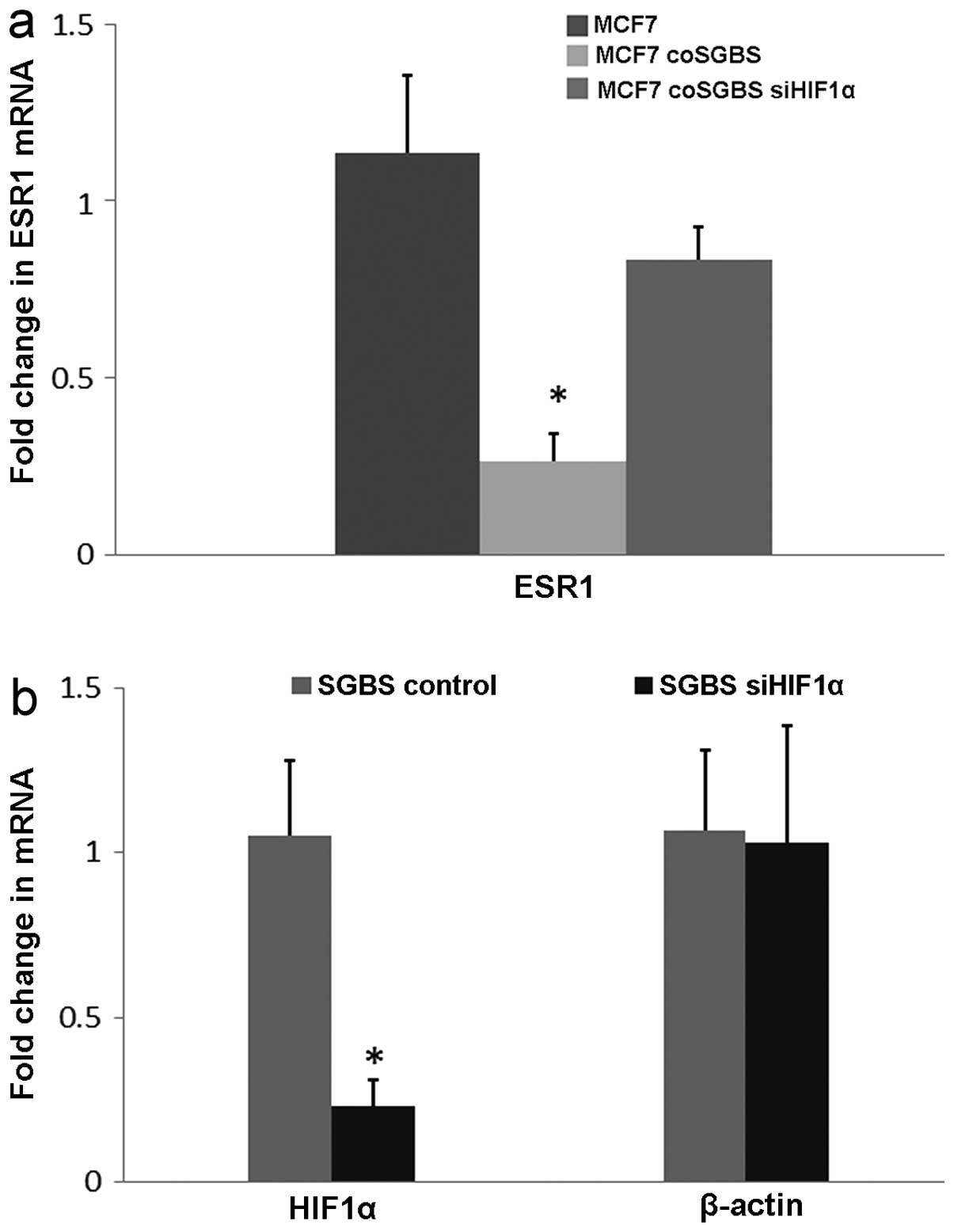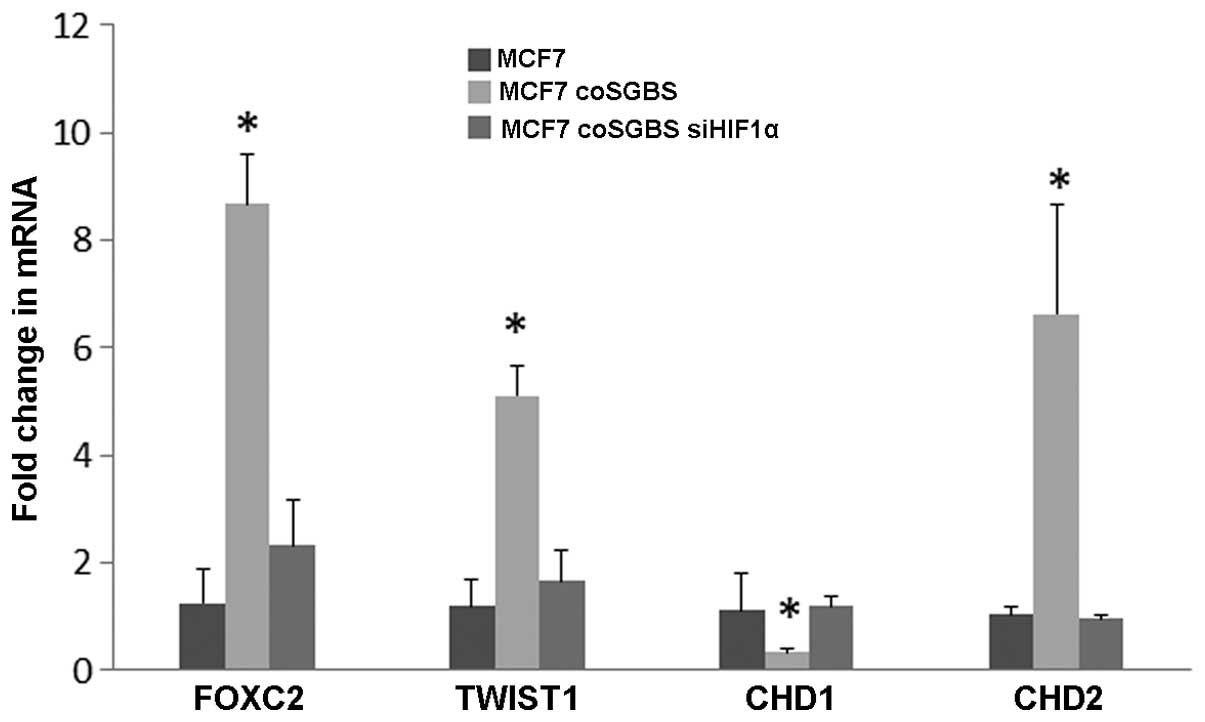|
1
|
Powers GL, Ellison-Zelski SJ, Casa AJ, Lee
AV and Alarid ET: Proteasome inhibition represses ERalpha gene
expression in ER+ cells: a new link between proteasome
activity and estrogen signaling in breast cancer. Oncogene.
29:1509–1518. 2010. View Article : Google Scholar :
|
|
2
|
Fox EM, Davis RJ and Shupnik MA: ERbeta in
breast cancer - onlooker, passive player, or active protector?
Steroids. 73:1039–1051. 2008. View Article : Google Scholar : PubMed/NCBI
|
|
3
|
Fowler AM and Alarid ET: Amping up
estrogen receptors in breast cancer. Breast Cancer Res. 9:3052007.
View Article : Google Scholar : PubMed/NCBI
|
|
4
|
Fisher B, Costantino J, Redmond C, Poisson
R, Bowman D, Couture J, Dimitrov NV, Wolmark N, Wickerham DL,
Fisher ER, et al: A randomized clinical trial evaluating tamoxifen
in the treatment of patients with node-negative breast cancer who
have estrogen-receptor-positive tumors. N Engl J Med. 320:479–484.
1989. View Article : Google Scholar : PubMed/NCBI
|
|
5
|
Leu YW, Yan PS, Fan M, Jin VX, Liu JC,
Curran EM, Welshons WV, Wei SH, Davuluri RV, Plass C, et al: Loss
of estrogen receptor signaling triggers epigenetic silencing of
downstream targets in breast cancer. Cancer Res. 64:8184–8192.
2004. View Article : Google Scholar : PubMed/NCBI
|
|
6
|
Ryu K, Park C and Lee Y: Hypoxia-inducible
factor 1 alpha represses the transcription of the estrogen receptor
alpha gene in human breast cancer cells. Biochem Biophys Res
Commun. 407:831–836. 2011. View Article : Google Scholar : PubMed/NCBI
|
|
7
|
Kurebayashi J, Otsuki T, Moriya T and
Sonoo H: Hypoxia reduces hormone responsiveness of human breast
cancer cells. Jpn J Cancer Res. 92:1093–1101. 2001. View Article : Google Scholar : PubMed/NCBI
|
|
8
|
Stoner M, Saville B, Wormke M, Dean D,
Burghardt R and Safe S: Hypoxia induces proteasome-dependent
degradation of estrogen receptor alpha in ZR-75 breast cancer
cells. Mol Endocrinol. 16:2231–2242. 2002. View Article : Google Scholar : PubMed/NCBI
|
|
9
|
Yi JM, Kwon HY, Cho JY and Lee YJ:
Estrogen and hypoxia regulate estrogen receptor alpha in a
synergistic manner. Biochem Biophys Res Commun. 378:842–846. 2009.
View Article : Google Scholar
|
|
10
|
Hosogai N, Fukuhara A, Oshima K, Miyata Y,
Tanaka S, Segawa K, Furukawa S, Tochino Y, Komuro R, Matsuda M, et
al: Adipose tissue hypoxia in obesity and its impact on
adipocytokine dysregulation. Diabetes. 56:901–911. 2007. View Article : Google Scholar : PubMed/NCBI
|
|
11
|
Rausch ME, Weisberg S, Vardhana P and
Tortoriello DV: Obesity in C57BL/6J mice is characterized by
adipose tissue hypoxia and cytotoxic T-cell infiltration. Int J
Obes. 32:451–463. 2008. View Article : Google Scholar
|
|
12
|
Chung S, Yoon IY, Shin YK, Lee CH, Kim JW,
Lee T, Choi DJ and Ahn HJ: Endothelial dysfunction and C-reactive
protein in relation with the severity of obstructive sleep apnea
syndrome. Sleep. 30:997–1001. 2007.PubMed/NCBI
|
|
13
|
Ye J, Gao Z, Yin J and He Q: Hypoxia is a
potential risk factor for chronic inflammation and adiponectin
reduction in adipose tissue of ob/ob and dietary obese mice. Am J
Physiol Endocrinol Metab. 293:E1118–E1128. 2007. View Article : Google Scholar : PubMed/NCBI
|
|
14
|
Wojtczak L and Schönfeld P: Effect of
fatty acids on energy coupling processes in mitochondria. Biochim
Biophys Acta. 1183:41–57. 1993. View Article : Google Scholar : PubMed/NCBI
|
|
15
|
Fridlyand LE and Philipson LH: Reactive
species and early manifestation of insulin resistance in type 2
diabetes. Diabetes Obes Metab. 8:136–145. 2006. View Article : Google Scholar : PubMed/NCBI
|
|
16
|
Millikan RC, Newman B, Tse CK, Moorman PG,
Conway K, Dressler LG, Smith LV, Labbok MH, Geradts J, Bensen JT,
et al: Epidemiology of basal-like breast cancer. Breast Cancer Res
Treat. 109:123–139. 2008. View Article : Google Scholar :
|
|
17
|
Slattery ML, Sweeney C, Edwards S, Herrick
J, Baumgartner K, Wolff R, Murtaugh M, Baumgartner R, Giuliano A
and Byers T: Body size, weight change, fat distribution and breast
cancer risk in Hispanic and non-Hispanic white women. Breast Cancer
Res Treat. 102:85–101. 2007. View Article : Google Scholar
|
|
18
|
Maiti B, Kundranda MN, Spiro TP and Daw
HA: The association of metabolic syndrome with triple-negative
breast cancer. Breast Cancer Res Treat. 121:479–483. 2010.
View Article : Google Scholar
|
|
19
|
Dirat B, Bochet L, Dabek M, Daviaud D,
Dauvillier S, Majed B, Wang YY, Meulle A, Salles B, Le Gonidec S,
et al: Cancer-associated adipocytes exhibit an activated phenotype
and contribute to breast cancer invasion. Cancer Res. 71:2455–2465.
2011. View Article : Google Scholar : PubMed/NCBI
|
|
20
|
Wabitsch M, Brenner RE, Melzner I, Braun
M, Möller P, Heinze E, Debatin KM and Hauner H: Characterization of
a human preadipocyte cell strain with high capacity for adipose
differentiation. Int J Obes Relat Metab Disord. 25:8–15. 2001.
View Article : Google Scholar : PubMed/NCBI
|
|
21
|
Varma V, Yao-Borengasser A, Bodles AM,
Rasouli N, Phanavanh B, Nolen GT, Kern EM, Nagarajan R, Spencer HJ
III, Lee MJ, et al: Thrombospondin-1 is an adipokine associated
with obesity, adipose inflammation, and insulin resistance.
Diabetes. 57:432–439. 2008. View Article : Google Scholar
|
|
22
|
Cooney CA, Jousheghany F, Yao-Borengasser
A, Phanavanh B, Gomes T, Kieber-Emmons AM, Siegel ER, Suva LJ,
Ferrone S, Kieber-Emmons T, et al: Chondroitin sulfates play a
major role in breast cancer metastasis: a role for CSPG4 and CHST11
gene expression in forming surface P-selectin ligands in aggressive
breast cancer cells. Breast Cancer Res. 13:R582011. View Article : Google Scholar : PubMed/NCBI
|
|
23
|
Livak KJ and Schmittgen TD: Analysis of
relative gene expression data using real-time quantitative PCR and
the 2(−Delta Delta C(T)) method. Methods. 25:402–408. 2001.
View Article : Google Scholar
|
|
24
|
Elvidge GP, Glenny L, Appelhoff RJ,
Ratcliffe PJ, Ragoussis J and Gleadle JM: Concordant regulation of
gene expression by hypoxia and 2-oxoglutarate-dependent dioxygenase
inhibition: the role of HIF-1alpha, HIF-2alpha, and other pathways.
J Biol Chem. 281:15215–15226. 2006. View Article : Google Scholar : PubMed/NCBI
|
|
25
|
Dirat B, Bochet L, Escourrou G, Valet P
and Muller C: Unraveling the obesity and breast cancer links: a
role for cancer-associated adipocytes? Endocr Dev. 19:45–52. 2010.
View Article : Google Scholar : PubMed/NCBI
|
|
26
|
Dawood S, Broglio K, Gonzalez-Angulo AM,
Kau SW, Islam R, Hortobagyi GN and Cristofanilli M: Prognostic
value of body mass index in locally advanced breast cancer. Clin
Cancer Res. 14:1718–1725. 2008. View Article : Google Scholar : PubMed/NCBI
|
|
27
|
McTiernan A, Irwin M and Vongruenigen V:
Weight, physical activity, diet, and prognosis in breast and
gynecologic cancers. J Clin Oncol. 28:4074–4080. 2010. View Article : Google Scholar : PubMed/NCBI
|
|
28
|
Creighton CJ, Sada YH, Zhang Y, Tsimelzon
A, Wong H, Dave B, Landis MD, Bear HD, Rodriguez A and Chang JC: A
gene transcription signature of obesity in breast cancer. Breast
Cancer Res Treat. 132:993–1000. 2012. View Article : Google Scholar
|
|
29
|
Xu J, Lamouille S and Derynck R:
TGF-beta-induced epithelial to mesenchymal transition. Cell Res.
19:156–172. 2009. View Article : Google Scholar : PubMed/NCBI
|
|
30
|
Liang M, Zhang P and Fu J: Up-regulation
of LOX-1 expression by TNF-alpha promotes trans-endothelial
migration of MDA-MB-231 breast cancer cells. Cancer Lett.
258:31–37. 2007. View Article : Google Scholar : PubMed/NCBI
|
|
31
|
Wang R, Ding G, Liang W, Chen C and Yang
H: Role of LOX-1 and ROS in oxidized low-density lipoprotein
induced epithelial-mesenchymal transition of NRK52E. Lipids Health
Dis. 9:1202010. View Article : Google Scholar : PubMed/NCBI
|
|
32
|
Sánchez-Elsner T, Ramírez JR,
Sanz-Rodriguez F, Varela E, Bernabéu C and Botella LM: A cross-talk
between hypoxia and TGF-beta orchestrates erythropoietin gene
regulation through SP1 and Smads. J Mol Biol. 336:9–24. 2004.
View Article : Google Scholar : PubMed/NCBI
|
|
33
|
Chen HC, Zhu YT, Chen SY and Tseng SC:
Selective activation of p120ctn-Kaiso signaling to unlock contact
inhibition of ARPE-19 cells without epithelial-mesenchymal
transition. PLoS One. 7:e368642012. View Article : Google Scholar : PubMed/NCBI
|
|
34
|
Goel HL and Mercurio AM: VEGF targets the
tumour cell. Nat Rev Cancer. 13:871–882. 2013. View Article : Google Scholar : PubMed/NCBI
|
|
35
|
van Uden P, Kenneth NS and Rocha S:
Regulation of hypoxia-inducible factor-1alpha by NF-kappaB. Biochem
J. 412:477–484. 2008. View Article : Google Scholar : PubMed/NCBI
|















